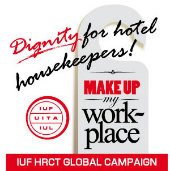 | WARNING: This is the OLD IUF website. Visit the NEW IUF website here: http://www.iuf.org |
Blackstone's Hilton Woes Will Weigh on Workers
Private equity operator Blackstone, "has good reason to be nervous about Hilton." They're not alone; the enormous leverage taken on to finance the buyout at the height of the debt bubble now weighs heavily on the more than one hundred thousand Hilton employees around the world, on the wider financial system, and on the US Treasury, and therefore US taxpayers. Here's why.
In July 2007, Blackstone bought the Hilton Hotels Corporation (490,000 rooms worldwide) for USD 26 billion, paying a premium of one-third over the company's share price. Blackstone and associated investors put in USD 5.6 billion in equity - the rest was financed by debt. Ignoring the growing fragility of the credit and real estate bubbles, financial analysts praised the deal, which capped a 5-year hotel buying spree for Blackstone (see Private-equity buyouts in the hotel industry). With the Hilton buyout, Blackstone owns some 4,000 hotels in 80 countries with 620,000 rooms, making it the world's largest hotelier by number of rooms.
Not long after the highly leveraged Hilton deal, markets crashed; occupancy rates and room revenues hit their lowest trough in decades and continue to fall. When Blackstone bought Hilton, the Bloomberg lodging index - which records the market capitalization of listed hotel companies - was up 38% on the previous year. It peaked at 300 in September 2007, and today stands at around 120.
At the time, however, financial markets saw it as yet another canny buyout. The money carousel, it seemed, would never stop spinning.
In March 2004, Blackstone bought the Extended Stay America chain for just under USD 2 billion, assuming at the same time USD 1.13 billion of the company's debt. Occupancy rates and net income had been falling over the previous two years, but markets were "frothing". Blackstone paid a 24% premium over the company's listed share price. At the time, Extended Stay, which primarily serviced business employees on longterm job assignments, had 475 hotels nationwide.
In April 2007, Blackstone sold Extended Stay to real estate investors Lightstone Group for USD 8 billion.
The deal was done with USD 1 billion in cash and 7 billion in debt. Lightstone had no experience in the hospitality sector, but markets were even frothier than in 2004. "This was a perfect opportunity for The Lightstone Group to expand its growing portfolio into the hotel industry and acquiring Extended Stay Hotels immediately puts us in a leadership position within the extended stay market," said the then CEO. "This transaction is consistent with our strategy of acquiring companies with outstanding brand identity and bringing the necessary resources to unlock long term value."
Two years later, in June 2009, Extended Stay filed for bankruptcy protection - with $7.1 billion in assets and $7.6 billion in debt at the end of last year. “Extended Stay is significantly over-leveraged and the projected cash flows cannot continue to service over $7 billion in debt,” according to the company's general counsel" - how they managed to make it this far would certainly make fascinating reading.
Who owns the debt? The bankruptcy proceedings will have to sort it out, but it's easier than with the earlier megabuyouts. Because the credit crisis hit soon after the deal was finalized, the banks had no chance to bundle the debt up into the kinds of securities which the LBO boom propelled into the furthest reaches of the financial universe. The banks still have most of it - but of course the banking landscape has also gone through some fundamental changes since then. The largest chunk of the secured debt (USD 984 million in mezzanine debt and 515 million in mortgage debt) is owned by Wachovia Bank NA, the bankrupt lender saved from collapse last year through a shotgun marriage with Wells Fargo. Citigroup had hoped to get it cheaper, with significant help from the US treasury, and sued when Wells Fargo topped their bid. But the federal government and US taxpayers aren't off the hook: the Federal Reserve has close to 900 million in Extended Stay debt.
Blackstone unloaded Extended Stay at the right moment, cashing in big time. Times have changed, as all but the financial amnesiacs know they must. They now have a significantly larger problem with Hilton - and so do Hilton workers.
Hilton, according to the October 29, 2009 Wall Street Journal article, is seeking to restructure its debt - which still stands at... USD 20 billion, meaning there has been no net debt reduction since the buyout over two years ago. According to the WSJ, "In the Hilton negotiations, Blackstone is considering contributing $800 million of new equity to buy back debt at a discount. It also is seeking to extend debt maturing in 2013 to 2016, while converting some junior slices of debt into equity. The $800 million in additional equity would come from funds managed by Blackstone that already have invested in the deal", Blackston's largest single investment.
As with the collapse of the much smaller Extended Stay, the federal government is sitting on a sizeable pile of this dubious paper. As a result of the deal which saw US taxpayers paying for the "merger" of the collapsing Bear Stearns with JP Morgan Chase, the Federal Reserve owns USD 4 billion of the debt - and the terms of the deal limit Blackstone's ability to buy it back on the cheap.
So with the hospitality industry suffering from severe recession, the value of commercial real estate tumbling and taking with it the financial house of cards built on these fictitious assets, lenders in revolt against the refinancing schemes (see Debt matters: what is at stake in the struggle to refinance portfolio companies) which weaken their claims and the US Treasury as a wild card, that leaves Hilton workers to bear the brunt of the damage.
The WSJ cites Blackstone President Tony James on a recent earnings call claiming "You can effectively rewrite history by changing a company's capital structure and reducing its leverage." Debt can be restructured, history cannot - restructuring debt at Hilton will inevitably involve attacks on employment levels and on terms and conditions across a very wide front. Unions need to absorb the lessons of the past.







